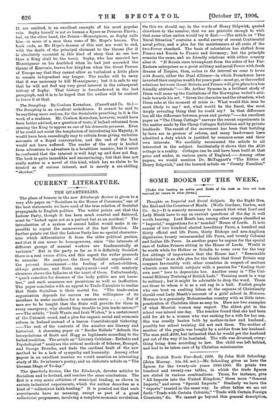CURRENT LITERATUR.E.
THE QUARTERLIES.
The place of honour in the new Edinburgh Review is given to a very able paper on " Socialism in the House of Commons," one of the best statements we have read of the true relation of Socialist propaganda to English politics. The writer points out that the Labour Party, though it has been much courted and flattered, must be "looked upon not as a portent but as an accident." The introduction of a system of second ballot would make it im- possible to repeat the manoeuvres of the last Election. He further points out that the Labour Party has no special character- istic which differentiates it from the older political parties, and that it can never be homogeneous, since "the interests of different groups of manual workers are fundamentally at -variance." But in the party so far as it is definitely Socialist there is a real raison d'être, and this aspect the writer proceeds to examine. He analyses the three Socialist expedients of the present Government—the feeding of school-children, old-age pensions, and State employment—and with masterly clearness shows the fallacies at the heart of them. Unfortunately, " quack remedies for diseases of the body politic are not harm- less," and such measures are pernicious as well as ineffective. 'The paper concludes with an appeal to Trade-Unionists to realise that State Socialism is their mortal foe. "The trade-union -organisation depends for success on the willingness of its members to make sacrifices for a common cause But if men are to be taught that the State will provide for them in every emergency, why should they trouble to join trade-unions?" —The article, "Irish Wants and Irish Wishes," is a restatement of the Unionist creed, and a plea for organic social and economic reform in Ireland instead of a barren Constitutional tinkering. —The rest of the contents of the number are literary and historical. A charming paper on "Border Ballads" defends the interpolations of Scott and Hogg as legitimate according to the ballad tradition. The article on " Literary Criticism : Esthetic and Psychological" analyses the critical methods of Scherer, Bourget, and George Brandes, and finds the cardinal fault of the new method to be a lack of sympathy and humanity. Among other papers in an excellent number we would mention an interesting study of Mr. Swinburne's poetry, and an elaborate article on " The German Stage of To-day."
The Quarterly Review, like the Edinburgh, devotes articles to Socialism and to Ireland, and reaches the same conclusions. The first is a very acute criticism of municipal trading, as shown in certain industrial experiments, which the author describes as a kind of "collectivist faith-healing." It is pointed out that such • -experiments have no meaning, except as part of a great collectivist programme, involving a complete economic revolution.
On this we should say, in the words of Henry Sidgwick, quoted elsewhere in the number, that we are patriotic enough to wish that some other nation would try it first.—The article on "The Naval Situation" contains a useful survey of recent Continental naval policy, and a plea for the maintenance at all costs of the two-Power standard. The basis of calculation has shifted from France and Russia to France and Germany; but the principle remains the same, and no friendly relations with either country alter it. "If Russia rises triumphant from the ashes of her Far- Eastern enterprises as a great military and naval Power with fresh dreams of Empire, then, unless in the interval we come to terms with Russia, either the Dual Alliance—in which Frenchmen have invested their surplus wealth for years past—must go, or the cordial relations between Great Britain and France will give place to a less friendly attitude."—Mr. Arthur Symons in a brilliant study of Ibsen well sums up the limitations of the Norwegian writer's atti- tude towards his art. " Given the character and the situation, what Ibsen asks at the moment of crisis is : What would this man be most likely to say ? not, what would be the finest, the most deeply revealing thing that he could say? In that difference lies all the difference between prose and poetry."—An excellent paper on "The Cheap Cottage" surveys the recent experiments in the matter made by the Cheap Cottages Exhibition and by private landlords. The result of the movement has been that building by-laws are in process of reform, and many landowners have admitted a duty which is justified by common-sense and their own interests. We cordially recommend the article to all interested in the subject. Incidentally it shows that the £150 cottage is a reality. Cottages can be and have been built at that price and under, in various parts of England.—Among other papers, we would mention Dr. McTaggart's "The Ethics of Henry Sidgwick," and the learned article on "County Families."














































 Previous page
Previous page